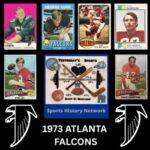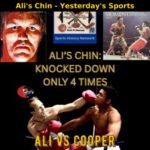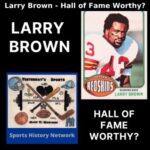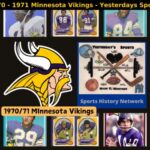Believe it or not, the Philadelphia Phillies franchise dates back to 1883, when Chester A. Arthur was President of the United States. The Phillies were originally known as the Philadelphia Quakers, but they were renamed the Phillies in 1890. Despite some outstanding seasons, the Phillies did not achieve first place until 1915, when they lost to the Red Sox in the World Series, four games to one.
In 1932, Phillies outfielder Chuck Klein won the NL MVP award, and the following year, he claimed the elusive Triple Crown. Despite having some good players on the team, the Phillies wouldn’t win the NL Pennant again until 1950, with pitcher Jim Konstanty winning the NL MVP that same year. However, the Phillies had the misfortune of facing the powerhouse New York Yankees in the World Series and lost four games to zero.
A New Hope in 1976: Schmidt, Carlton, and a Breakthrough Season
From 1951 to 1975, the Phillies experienced just nine winning seasons and no pennants. One of the few highlights was when pitcher Steve Carlton won the Cy Young Award in 1972. However, that would all change in 1976.
The Phillies finished the 1976 season with 101 wins and 61 losses, marking their best record in team history. Centerfielder Garry Maddox led the team with a batting average of .330, while third baseman Mike Schmidt topped the team in RBIs with 107. Schmidt also led both the team and the league in home runs, hitting 38. Pitcher Steve Carlton had a 20–7 record with a 3.13 ERA, and Jim Lonborg recorded an 18–10 record with a 3.08 ERA.
Mike Schmidt, along with shortstop Larry Bowa, second baseman Dave Cash, left fielder Greg Luzinski, and catcher Bob Boone, were named to the All-Star team. Danny Ozark received the Manager of the Year Award. However, the season concluded in disappointment as the Reds swept them in the NLCS.
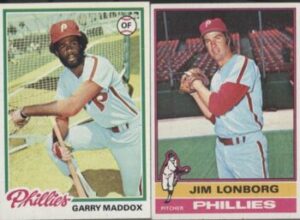
Déjà Vu and Disappointment: The 1977 and 1978 NLCS Heartbreaks
The loss to the Reds didn’t discourage them. The 1977 Phillies matched their 101–61 record from 1976. Although he recorded 140 strikeouts for the season, the third most in MLB, Greg Luzinski had a stellar year. He batted .309, hit 39 home runs, the third most in the league, and drove in 130 runs, the second highest in the league.
Mike Schmidt hit 38 home runs, the fifth most in the league, and drove in 104 runs. The Phillies had one of, if not the best, benches in baseball. Utility player Tommy Hutton appeared in 107 games and batted .309. Backup catcher Tim McCarver participated in 93 games and batted .320. Reserve outfielder Bake McBride played in 85 games and hit .339. Backup first baseman Davey Johnson played in 78 games and batted .321.
Pitcher Steve Carlton led both the team and the league with 23 wins. His 23–10 record and 2.64 ERA earned him another Cy Young Award. Larry Christenson also enjoyed a remarkable season, finishing with a 19–6 record. Tug McGraw had an excellent season as the Phillies’ top relief pitcher.
Greg Luzinski, Mike Schmidt, and Steve Carlton made the All-Star team. However, for the second consecutive year, the Phillies lost in the NLCS, this time to the Dodgers, three games to one.

The Phillies weren’t quite as dominant in 1978, finishing the season with a 90–72 record, but that was enough to secure first place. Greg Luzinski had another impressive year, belting 35 home runs and driving in 101 RBIs. Shortstop Larry Bowa led the team in batting average, hitting .294.
Steve Carlton was the top pitcher once again, winning 16 games with a 2.84 ERA. Larry Bowa, Bob Boone, and Greg Luzinski made the All-Star team. The season concluded in frustration, as the Phillies lost to the Dodgers once more in the NL Championship Series.
The Pete Rose Effect: High Hopes and Hard Lessons in 1979
During the offseason, the Phillies signed free agent Pete Rose, expecting him to help lead Philadelphia to the World Series. However, injuries and a lackluster pitching staff ultimately derailed the team. They struggled throughout the season, and with a 65-67 record heading into September, something had to be done.
As often happens in baseball, the manager received the bulk of the blame, resulting in Danny Ozark’s dismissal. Dallas Green took over, and the Phillies won 19 of their last 30 games. Yet it was still too little, too late, as they finished the season 14 games out of first place. Mike Schmidt hit 45 home runs, the second highest in the league, while the rest of the team managed only 74. Schmidt also led the team in RBIs with 114.
Pete Rose posted the best batting average on the squad, hitting .331. Aside from Steve Carlton, who won 18 games, the pitching staff faced difficulties. Even their top relief pitcher, Tug McGraw, struggled, ending the season with a 5.16 ERA. Larry Bowa, Bob Boone, Pete Rose, Mike Schmidt, and Steve Carlton all made the All-Star team.


Turning the Corner: A Gritty Start to the 1980 Season
The Phillies had a slow start in 1980, and by the end of May, they weren’t impressing anyone with a 23–18 record. By the All-Star break, the Phillies appeared to be a slightly above-average team with a 41–35 record. Fortunately for them, no other team in their division was performing exceptionally well either. Mike Schmidt, Pete Rose, and Steve Carlton were the only Phillies selected for the All-Star Team.
By the end of August, the Phillies stood at 68–60, just a half-game out of first place. However, they won 16 of their next 24 games, taking a half-game lead over the Montreal Expos. With only ten games remaining, six of which were against the Expos, the Phillies needed to continue their winning streak. The Phillies and Expos kicked off a three-game series on September 26, with Montreal taking two of three to reclaim their half-game lead.
Next for the Phillies was a four-game series against the Chicago Cubs. They swept the Cubs, and it all came down to the final three games against Montreal. The two teams were tied for first place with identical 89–70 records. Philadelphia won the series two games to one.
Mike Schmidt had a memorable season, leading MLB with 48 home runs and topping the National League with 121 RBIs. He also achieved a solid batting average of .286 and won the NL MVP award. Starting right fielder Bake McBride posted a .309 average, while backup catcher Keith Moreland batted .314 and backup outfielder Lonnie Smith hit .339.
Pitcher Steve Carlton enjoyed another impressive season with a 2.34 ERA and a 24–9 record, earning his third Cy Young award. Tug McGraw rebounded from his lackluster 1979 season by shutting down opponents with an exceptional 1.46 ERA.
The Epic 1980 NLCS: Phillies vs. Astros
The Phillies would now play the Houston Astros in the NL Championship Series. In Game One, Steve Carlton pitched seven complete innings and allowed only one run. Tug McGraw pitched the final two innings without allowing any runs. Greg Luzinski hit a two-run blast in the sixth inning, and Philadelphia won Game One 3–1. The home run turned out to be the only one of the series.


Game two was a back-and-forth battle that went into extra innings. In the tenth inning, with the game tied 3–3, Houston scored four runs, while Philadelphia could only manage one. The Astros’ victory tied the series one game to one.
Game three was a pitcher’s duel, going into the 11th inning with neither team scoring. The Astros finally triumphed 1–0, leaving Phillies fans bracing for yet another postseason disappointment.
Game four was another back-and-forth battle filled with controversy, as managers and players passionately contested the umpires’ decisions. It was the third consecutive game to go into extra innings, but this time, the Phillies emerged victorious, winning 5–3.
Game five was far from a pitcher’s duel as the two teams combined for 27 hits. It didn’t look promising for the Phillies, who trailed 5–2 after seven complete innings with Nolan Ryan on the mound for the Astros. However, the Phillies weren’t ready to go down without a fight. They scored five runs in the top of the eighth inning to take a 7–5 lead. The Astros responded immediately with two runs of their own in the bottom of the eighth. Neither team scored in the ninth inning, so once again, these two determined teams would battle it out in extra innings.
In the top of the tenth, a double by Del Unser was followed by a double from Garry Maddox, giving Philadelphia an 8–7 lead. In the bottom of the tenth, reliever Dick Ruthven retired the Astros in order, and the Phillies were headed to their first World Series since 1950. It was arguably the most fiercely contested Championship Series ever, and some questioned whether the Phillies would have anything left in the tank for the World Series.
Add Your Heading Text HereFinishing the Fight: The 1980 World Series Against the Royals
The Phillies’ opponent would be the Kansas City Royals. The two teams had a lot in common. The Royals, like the Phillies, had struggled to reach the World Series, losing the ALCS three years in a row to the Yankees (1976–1978) before finally beating them in 1980.
Rookie pitcher Bob Walk would start for the Phillies, and he struggled early, allowing a two-run homer in the second inning and another in the third. If there was any doubt about how much the Phillies had left after their tough series with the Astros, they erased all uncertainty in the bottom of the third inning, scoring five runs off Royals pitcher Dennis Leonard. Three of those runs came from a three-run homer by Bake McBride. Philadelphia added a run in the bottom of the fourth and another in the fifth inning to take a 7–4 lead.
Pitcher Bob Walk, who had struggled earlier in the game, kept the Royals from scoring in innings four through seven. However, the Royals’ Willie Aikens hit his second two-run home run off Walk in the top of the eighth inning, narrowing the score to 7–6. Closer Tug McGraw then entered the game and ensured Kansas City wouldn’t score any more runs, sealing the 7–6 victory for Philly.

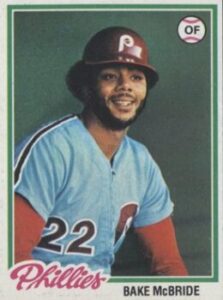
After four and a half scoreless innings, the Phillies drew first blood in the bottom of the fifth inning of game two, scoring two runs. The Royals got their first run due to an error in the sixth inning.
Steve Carlton pitched six complete innings without allowing an earned run, but the Royals finally broke through in the seventh, scoring three runs to take a 4–2 lead. However, the never-say-die Phillies fought back in the eighth, scoring four runs. Ron Reed replaced Carlton in the ninth inning to shut down the Royals. The Phillies won 6–4 to take a two-to-zero lead in the series.
American League MVP George Brett put the Royals on the scoreboard first in Game 3 with a solo home run in the first inning, but the Phillies tied it in the second. Kansas City regained the lead in the bottom of the fourth, only for Mike Schmidt to equalize with a home run in the fifth.
Amos Otis put the Royals back on top with a solo shot in the seventh, but Pete Rose tied the game once more in the eighth with an RBI single. In yet another extra-inning game, the Royals scored the winning run in the bottom of the tenth.


The Royals came out swinging in game four, sending starting pitcher Larry Christenson to the showers after scoring four runs in the first inning. Willie Aikens hit his third home run of the series. The Phillies scored a run in the second inning but gave it right back when Aikens hit another home run. The Royals were held scoreless for the rest of the game, but those five runs were enough for a 5–3 victory.
After three scoreless innings in game five, Mike Schmidt hit a two-run home run to give Philadelphia the lead. The Royals narrowed the gap to 2–1 in the fifth inning. After an Amos Otis home run tied the game in the sixth, the Royals scored another run on a sacrifice fly RBI by UL Washington. The Phillies added two runs in the top of the ninth to take a 4–3 lead. Kansas City had the bases loaded in the bottom of the ninth with two outs, but Tug McGraw struck out the final batter, giving the Phillies a three-games-to-two lead in the series.
With Game Six at Veterans Stadium and Steve Carlton on the mound, the Phillies aimed to clinch the series. Philadelphia held a 4–0 lead after seven complete innings, and Phillies fans could hardly contain their excitement, but the Royals silenced the crowd by loading the bases in the top of the eighth inning. Closer Tug McGraw, however, allowed only one run, leaving the Phillies three outs away from winning their first World Series in team history.
The Phillies went down in order in the bottom of the eighth, but the Royals would not back down easily, loading the bases again in the top of the ninth with only one out. The next batter fouled out, leaving the Phillies one out away from what some believed might never occur. McGraw struck out the following batter, and the long-awaited World Series trophy finally belonged to the City of Philadelphia. Mike Schmidt earned the World Series MVP Award.
1980 Good Time For Philly Fnas
It was a good time to be a sports fan in Philadelphia. In May 1980, the 76ers reached the NBA finals, the Flyers reached the Stanley Cup finals, and the Eagles reached the Super Bowl in January 1981. All three of those teams lost, but the fact that all four of the Philadelphia sports teams made it to the finals during those eight months, with one winning, is quite impressive.
In 1983, the Phillies secured their fourth National League pennant but lost to the Baltimore Orioles in the World Series. Since then, they have captured four more pennants and another World Series title in 2008.
Please Consider Sharing If You Like This Article
Mark Morthier is the host of Yesterday’s Sports, a podcast dedicated to reliving memorable sports moments from his childhood days and beyond. He grew up in New Jersey just across from New York City, so many of his episodes revolve around the great sport’s teams of the 70s for the New York area.
He is also an author of No Nonsense, Old School Weight Training (Second Edition): A Guide for People with Limited Time and Running Wild: (Growing Up in the 1970s)

Check out Mark's Books Below
Please Note – As an Amazon Associate I earn from qualifying purchases
Resources
More From Yesterday's Sports
1973 Atlanta Falcons – Best Season In First Decade Of Existence
The Atlanta Falcons joined the NFL as an expansion team...
Read MoreMuhammad Ali’s Chin: Knocked Down Only 4 Times
Muhammad Ali’s boxing career is well documented, so instead of...
Read MoreLarry Brown – Is He Hall of Fame Worthy?
A committee member recently asked me my opinion on inducting...
Read More1970s Minnesota Vikings : Would A Better QB Helped Them Win A Super Bowl?
Here’s a question I often hear, especially from Minnesota Vikings...
Read More


